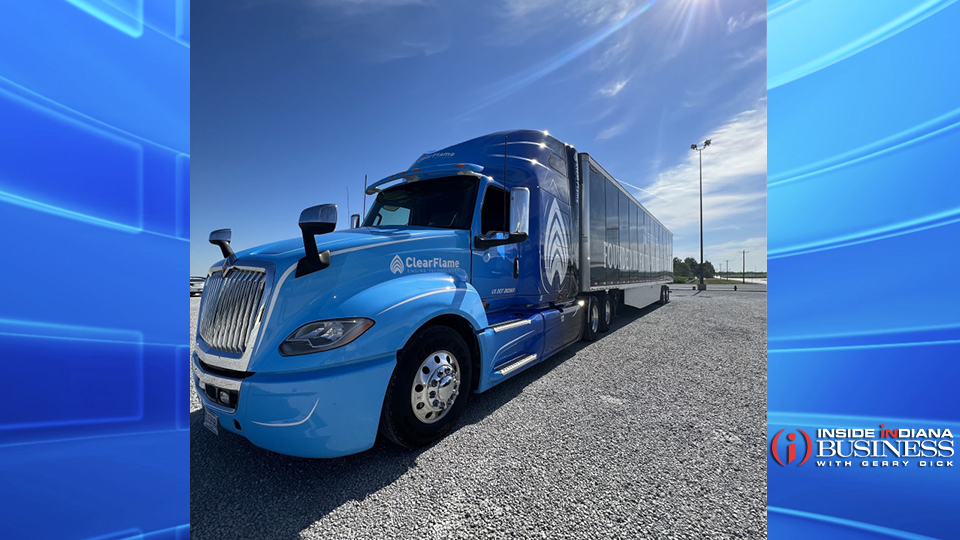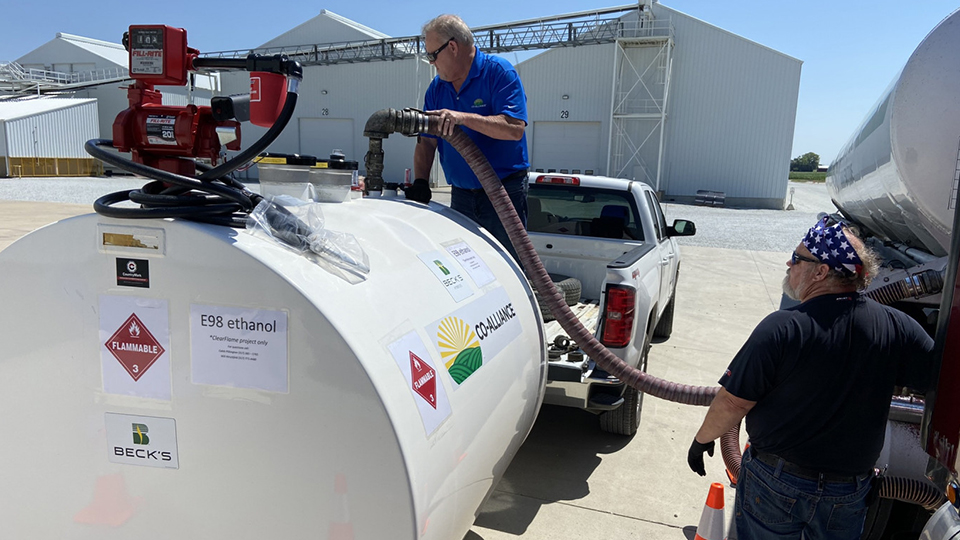Indiana ag firms testing unique ethanol use in semi-trucks
Subscriber Benefit
As a subscriber you can listen to articles at work, in the car, or while you work out. Subscribe Now
ATLANTA, Ind. - As the automotive industry focuses on the transition to electric vehicles, a coalition of four Indiana-based agricultural companies still sees value in internal combustion engines burning biofuels, but with a technological twist. Atlanta-based Beck’s Hybrids, Central Indiana Ethanol in Marion and Indianapolis-based cooperatives CountryMark and Co-Alliance are partnering with Illinois-based ClearFlame Engine Technologies on a pilot program to test a diesel engine not running on traditional diesel fuel. Beck’s is operating a one-of-a-kind semi-truck in Indiana that has been converted to operate on nearly 100% corn-based ethanol.
In an interview with Inside INdiana Business, Beck’s Director of Innovation Brad Fruth said the technology for big equipment is not ready for the shift to electric vehicles.
“We see some industries racing towards this desire to electrify. We know that is just not possible now with large engines,” said Frueth. “We think that this fills that gap towards…climate smart goals, but yet do it with a fuel source that’s being fueled by farmers.”
LISTEN: Fruth further explains why Beck’s is supporting this endeavour.
ClearFlame’s pilot truck has a Cummins engine. It has been retrofitted to adjust to E98 that is being produced by Central Indiana Ethanol. Unlike traditional car fuel that runs on a blend of 10% ethanol and 90% gasoline (E10), this fuel is nearly 100% fuel made from grain. Refiners add 2% denaturant to make fuel unfit for human consumption.
“It does reduce emissions significantly, reduces the price, and supports rural America,” said Jeff Harts with Central Indiana Ethanol. “We’re blessed to be able to have the opportunity to partner with another Indiana business in in an opportunity like this.”
Beck’s is operating the rig throughout central Indiana and accumulating miles in a range of operating conditions between Beck’s Indiana locations.
“Being an alpha tester, it’s one thing to drive an over-the-road truck down the road and unloaded. It’s another thing to drive it fully loaded. We’ve been testing it with a variety of different payloads to start to collect that type of information,” said Fruth.
ClearFlame says its technology allows operators of heavy-duty engines, including agriculture, construction, and long-haul trucking to transform the engines to operate with reduced emissions, powered by liquid fuel that already exists.
“Electric is still more than a decade away from being workable for heavy-duty industries, like long-haul trucking. Trucking is a huge market, that is only growing in size. We need solutions that can work today,” said the ClearFlame website.
CIE’s Harts says this alpha test focuses on over-the-road trucks, but the technology could also be applied to farm machinery, and beyond.
“Locomotives, even ships, these are all diesel engines that that this technology could be deployed in , and create opportunities for a lower emission, lower carbon world,” said Harts.
LISTEN: Harts said this technology can go beyond the highway.

ClearFlame co-founder and Chief Executive Officer BJ Johnson said he was impressed with the pro-ethanol Indiana coalition to support this undertaking.
“[It] goes even further to underscore how easy it will be for ClearFlame’s technology to rapidly scale for fleets across the country,” said Johnson. “Ethanol is already distributed through fuel terminals nationwide. It’s proven to be a much greener fuel, with substantially lower carbon emissions than diesel, and critically, significant cost savings.”
According to data from AAA Motor Club, the average price for diesel fuel Monday was $4.28 per gallon. A year ago, it was $3.62 a gallon.
While the price of fuel has skyrocketed over the past two years, Fruth says Beck’s decision was not made solely on its fuel budget. With the integration of ethanol in diesel engine technology, the partners think it can drive demand and production for ethanol for row crop farmers across the nation.
“Our customers as farmers see ethanol as a great place to be able to sell crops,” said Fruth. “And we’ve not had a technology yet where we can use 100% ethanol. Here’s, here’s a possibility that some industries that rely on liquid fuel could use a true 100% renewable resource grown by American farmers.”
ClearFlame expects to achieve commercialization of its engine modification technology by the end of 2023.
